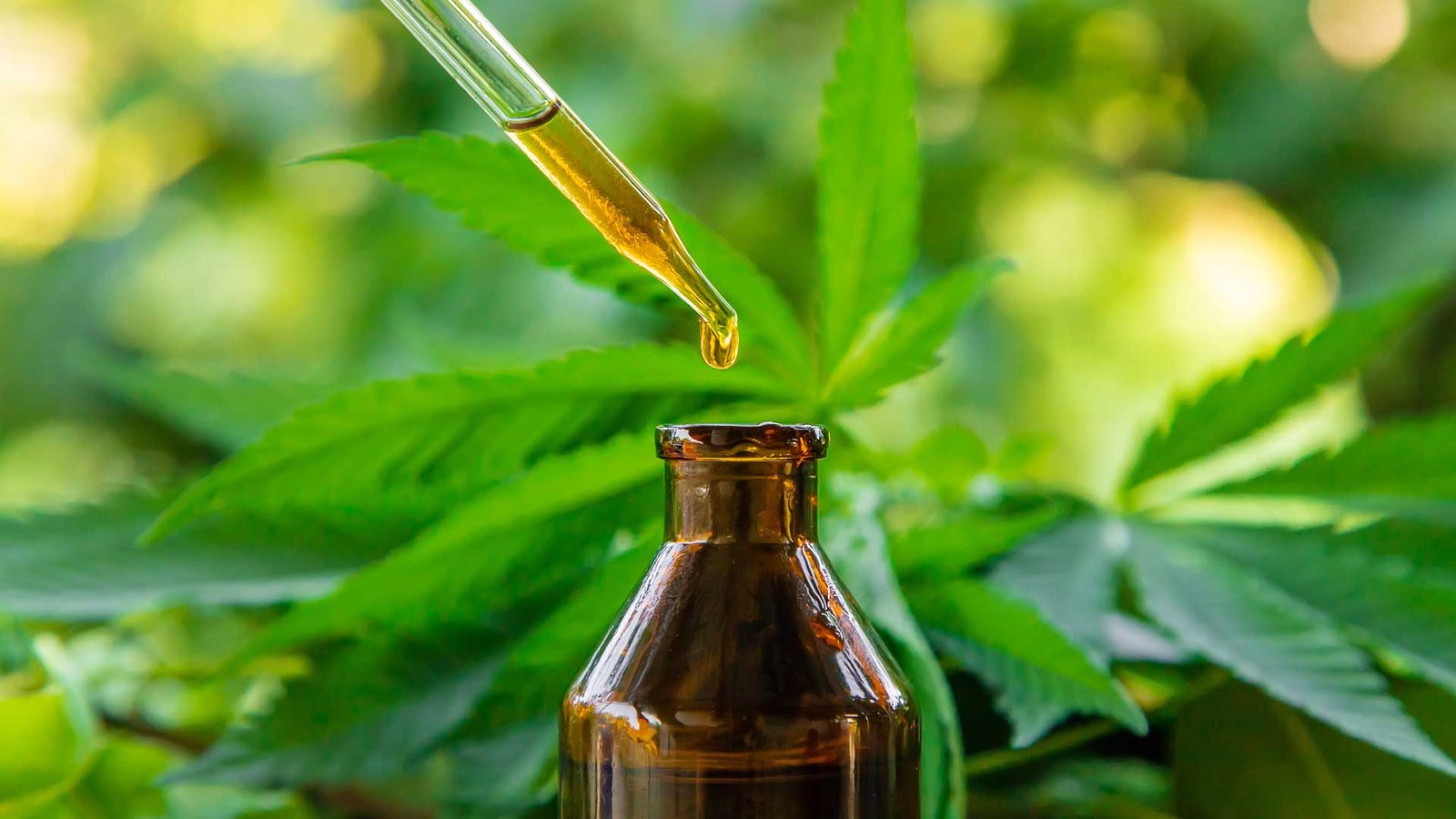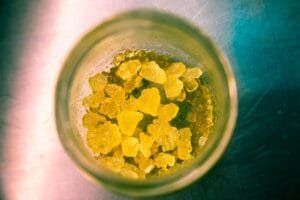Rick Simpson Oil (RSO) has gained an unconventional attention in the marijuana community, driven by its medical potential. A high-potency cannabis oil was created by a Canadian engineer, Rick Simpson, in 2003. After been diagnosed with basal cell carcinoma more commonly known as skin cancer, Simpson successfully treated his condition using a homemade cannabis extract, which he named Rick Simpson Oil. Today, RSO oil is a potential contender among cannabis products for therapeutic applications. Here we look at this oil’s process, uses, and benefits.
Sections
ToggleWhat Is RSO Oil?

Rick Simpson Oil is a full-spectrum cannabis concentrate that differs from other extracts due to its high THC content and a unique extraction method. This product doesn’t isolate specific compounds like other extracts; rather, RSO oil uses the entire cannabis plant, preserving all cannabinoids, terpenes, flavonoids, and other therapeutic compounds in their natural ratios. Preserving the original compounds, especially in their natural ratios, gives this cannabis extract a thick, dark, tar-like appearance with THC concentrations that can reach up to 90% or higher.
How Is RSO Made?
RSO oil is prepared using a sophisticated extraction method that effectively preserves the full spectrum of cannabis compounds. Let’s check out how Rick Simpson Oil is made step-by-step.
- Plant Preparation
The first step is preparing cannabis biomass for extraction, which involves grinding plant material thoroughly to an optimal consistency. This ensures maximum surface area for solvent contact. The plant material is usually chilled to preserve delicate terpenes and prevent degradation of temperature-sensitive compounds.
- Solvent Extraction
Approved solvents, typically food-grade ethanol, are used to dissolve cannabinoids, terpenes, and other active compounds from the biomass.
- Filtration
The mixture of extracts and solvent is filtered to remove all plant material, leaving behind only the solvent-dissolved compounds. Multiple filtration cycles take place to completely separate unwanted plant matter.
- Solvent Recovery
Controlled evaporation processes using specialized equipment are used to recover extracts from the concentrate. For the best quality, vacuum distillation and recovery systems are used to separate solvents safely while maintaining the integrity of the cannabis compounds.
- Decarboxylation
The raw RSO oil undergoes decarboxylation, a heating process that converts inactive cannabinoid acids (like THCA) into their active forms (like THC). This is essential to ensure oil is bioavailable and ready for consumption.
- Purification & Testing
The final RSO oil undergoes further purification cycles to remove any residual solvents. A comprehensive laboratory testing verifies the potency, purity, and safety of the final product.
Watch this short video to learn how to make RSO.
RSO Process & Extraction Equipment
Final extract’s quality and potency depend a lot on how RSO is made. A commercial facility utilizes advanced closed-loop extraction systems and sophisticated processing equipment for the best quality output as well as safety. The Modern RSO process is much more evolved and significantly efficient than Rick Simpson’s original home-based techniques.
Advanced extraction systems, such as those provided by Root Sciences, offer several advantages:
- Safety: Closed-loop systems prevent exposure to solvents and flammable vapors.
- Consistency: Automated controls deliver repeatable results across batches.
- Efficiency: Higher yields with reduced waste and solvent loss.
- Compliance: Systems meet GMP and regulatory standards for legal cannabis markets.
- Scalability: Easy transition from small-batch to large-scale operations without compromising quality.
For cannabis producers, investing in professional-grade equipment directly impacts product reliability, consumer trust, and long-term profitability.
What Is RSO Used For?
RSO oil is one of the most versatile cannabis products on the market with a wide range of therapeutic applications. Its uses include both medical and wellness applications:
- Pain management: RSO oil is a potent analgesic, meaning it can manage chronic pain conditions such as arthritis and inflammatory disorders.
- Cancer-related research: Given the origin of RSO, many patients use it as a complementary therapy during cancer treatment. However, this application needs more clinical research for a better understanding and evidence.
- Neurological conditions: Like other cannabis extracts, RSO shows promise for epilepsy, multiple sclerosis, and other neurological disorders.
- Sleep and relaxation: The high THC concentration and full-spectrum profile make RSO effective for insomnia and other sleep disorders.
- General wellness: RSO concentrate can be incorporated into general wellness routines for overall health maintenance and preventive care.
Benefits of RSO

RSO benefits are versatile because it’s not only about simple THC delivery, but a synergistic cannabis delivery.
- Full-spectrum profile: RSO oil preserves the complete range of cannabis compounds that too in their natural ratio offering full-spectrum therapeutic effects.
- High potency: With THC concentrations up to 90%, RSO can deliver powerful effects even with minimal dosage.
- Versatility: RSO can be consumed orally, applied topically, or incorporated into various products to suit different therapeutic needs.
- Consumer preference: Medical cannabis patients prefer RSO’s comprehensive cannabinoid profile over isolated extracts.
- Market differentiation: RSO represents premium quality and therapeutic focus, creating a niche in the crowded cannabis market.
Safety, Precautions & Legal Considerations
To maintain quality and safety, precautions must be taken.
- Safe extraction: Professional-grade equipment, like that offered by Root Sciences, and trained staff are essential for safe RSO production.
- Residual solvent removal: As with any solvent-based extraction method, proper purging is mandatory to ensure no harmful residual solvents remain in the final product.
- Laboratory testing: Third-party testing verifies potency, purity, and absence of contaminants, and adds a distinct trust factor.
- Consumer safety: RSO can have up to 90% THC, and such high potency requires careful dosing and gradual tolerance building.
- Training & SOPs: To maintain quality and safety, extraction facilities must maintain strict standard operating procedures.
Legal considerations:
- State compliance: Due to high THC percentage, the legality of RSO oil varies by jurisdiction. Check whether RSO is permitted for medical use or prohibited before use.
- Federal regulations: Cannabis remains federally controlled, hence the legal landscape for RSO production and distribution is complex.
- Licensing requirements: Commercial RSO manufacturers must get appropriate state licenses and regulatory compliance to offer their products in legal markets.
RSO vs. Other Cannabis Oils
Here’s a quick comparison of RSO with other cannabis oils:
- RSO vs. CBD oil: RSO extract has high THC levels and full-spectrum compounds, while CBD oil has minimal THC and primarily isolated cannabidiol.
- RSO vs. Distillates: We get all plant compounds in natural ratios in RSO, but distillates isolate specific cannabinoids for targeted effects.
- RSO vs. Concentrates: RSO oil is primarily for oral consumption and therapeutic applications, while other cannabis concentrates are often designed for vaporization or dabbing.
Storage and Handling

For long shelf life and benefits, proper storage and handling are essential.
- Temperature control: Always store RSO oil in cool, dark environments to prevent cannabinoid degradation and potency loss.
- Airtight containers: Oxidation can hamper oil’s therapeutic compounds and consistency; that’s why store RSO in airtight containers.
- Child-resistant packaging: To keep it away from minors, store it in child-resistant packaging. It will prevent accidental access.
- Shelf-life monitoring: With proper storage and handling, RSO maintains potency for extended periods. However, regular quality checks ensure optimal therapeutic effectiveness.
Conclusion
Rick Simpson Oil is an incredible evolution of cannabis products offering a potent therapeutic option with a full-spectrum profile. Excellent for cannabinoid therapy, RSO is a carefully crafted, scientifically backed cannabis extract. Supported by professional extraction methods, rigorous testing protocols, and growing clinical understanding, RSO concentrate represents the intersection of traditional plant medicine and modern extraction science, offering hope and relief to patients seeking comprehensive cannabinoid therapy.




